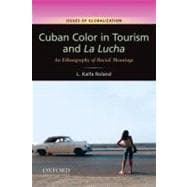
Note: Supplemental materials are not guaranteed with Rental or Used book purchases.
Purchase Benefits
What is included with this book?
| Preface | p. ix |
| Race, Tourism, and Belonging in Cuba | p. 1 |
| Welcome to Cuba | p. 2 |
| The Meaning(s) of "Race" | p. 4 |
| Tourism and the Caribbean | p. 8 |
| Socialism and Cuba's Revolutionary Ideal | p. 11 |
| Post-socialist Globalization | p. 13 |
| Methodology | p. 15 |
| "Blackness" and Race Matters in Cuba | p. 20 |
| Raciality in Cuba | p. 22 |
| Race and the Revolution | p. 31 |
| From Black(ness) to White(ned) | p. 33 |
| Gendered Race/Raced Gender | p. 37 |
| Conclusion | p. 41 |
| Surviving through La Lucha | p. 44 |
| La Lucha | p. 46 |
| Jineteros (Hustlers) | p. 52 |
| Marrying the Other | p. 57 |
| Conclusion | p. 62 |
| Tourism and Belonging | p. 64 |
| Who Tours Cuba? | p. 66 |
| Privilege and Place | p. 67 |
| Power and Belonging | p. 75 |
| The Yuma/Jinetero Dynamic | p. 77 |
| Conclusion | p. 83 |
| Of Shorts and Segregated Socialism | p. 87 |
| Separate and Unequal | p. 89 |
| Transition or Transformation? | p. 91 |
| Conclusion | p. 93 |
| Epilogue: Where Are They Now? | p. 96 |
| From Jineteros to Perros Callejeros | p. 97 |
| Yumas Out, Pepes In | p. 99 |
| Raul Castro and Change | p. 99 |
| Timeline of Cuban History | p. 102 |
| Student Resource Guide | p. 105 |
| Glossary of Key Terms | p. 109 |
| Glossary of Key Spanish/Cuban Terms | p. 115 |
| Bibliography | p. 117 |
| Index | p. 125 |
| Table of Contents provided by Ingram. All Rights Reserved. |
The New copy of this book will include any supplemental materials advertised. Please check the title of the book to determine if it should include any access cards, study guides, lab manuals, CDs, etc.
The Used, Rental and eBook copies of this book are not guaranteed to include any supplemental materials. Typically, only the book itself is included. This is true even if the title states it includes any access cards, study guides, lab manuals, CDs, etc.